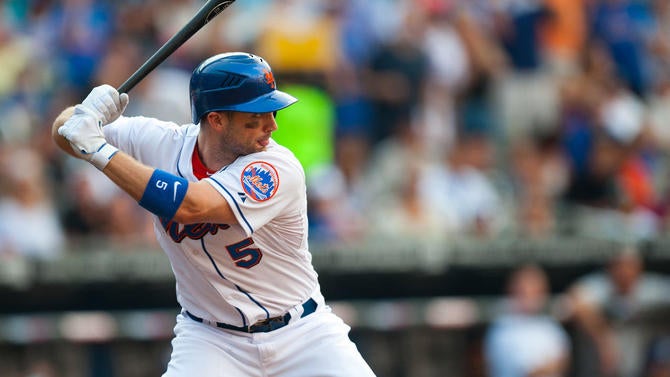When it comes to Mets third baseman David Wright, good news on injuries has been hard to come by throughout the past several years. He's had spinal stenosis and a herniated disc in his neck through 2015 and 2016. Most recently, Wright needed surgery on his lower back and on to repair his rotator cuff (shoulder).
On that front, Wright once again got some bad news Tuesday:
David Wright was reexamined Monday by back specialist Dr. Robert Watkins in Los Angeles. His shoulder and lower back issues persist, the Mets say, and he will refrain from baseball activity for another eight weeks.
— Anthony DiComo (@AnthonyDiComo) March 13, 2018
Relatively speaking (as this isn't life and death and it's a baseball player with a big contract), it's pretty sad how much injuries have ravaged Wright's career.
He didn't play in the majors at all last season and hasn't appeared since May 27, 2016. With the latest news, his earliest return would still mean that he's missed at least two calendar years since last playing.
Wright only managed 37 games in 2016 and 38 regular-season games in 2015. Even in 2014, he played hurt (left rotator cuff injury) and appeared in 134 games, with just 112 games in 2013 (strained right hamstring).
We have to go all the way back to 2012, when Wright was 29 years old, that he played what would be considered a full season.
Of course, in 2011, Wright was held to 102 games (stress fracture, back).
Injuries happen, but this has been a run of awful luck for Wright. Obviously, some of his current injuries stemmed from previous issues as well. He's 35 years old and has been through surgeries to several different body parts. His body has just been ravaged by baseball.
Wright is one of the more likable people in baseball and is rightfully very popular among Mets fans (excluding a small percentage of morons who would blame him for being injured).
Obviously, in order to become a Hall of Famer, so many things have to break right, including continuing great performance into a player's 30s. We can't know how Wright would have aged as a player had he remained healthy.
We do know that he was deprived of his chance to continue rounding out a possible Hall of Fame resume by all these injuries.
Check out his track at two different career points.
Through age 27
Wright was already a five-time All-Star with two Gold Gloves, two Silver Sluggers, three top-10 MVP finishes (including a top-five). He was a career .305/.383/.516 (136 OPS+) hitter with 258 doubles, 169 homers and 138 steals in 6 1/2 seasons. His 8.3 WAR in 2007 is more than MVP-caliber while his 6.8 in 2008 is pretty close to MVP level.
Through that age-27 season, baseball-reference.com shows Scott Rolen, Duke Snider, Chipper Jones, George Brett, Ron Santo and Carl Yastrzemski among the top 10 statistically similar players to Wright.
At age 27, a player still has a long way to go in building his Hall of Fame resume, but there's a foundation that has been built. Wright was on the way.

He continued that path even through the start of the injuries.
Through age 30
A career .301/.382/.506 (137 OPS+) hitter, Wright more or less maintained his rate stat pace. He was now up to 1,558 hits, 345 doubles, 222 homers, 876 RBI, 853 runs and 183 stolen bases.
Getting through an age-36 or -37 or even -38 season while being healthy and productive would've meant Wright having a shot at things like 2,500 (or even closer to 3,000) hits, 550 doubles, 350-400 home runs and maybe around 1,500 in RBI and/or runs.
He was now a seven-time All-Star with four top-10 MVP finishes. He had six years with at least 4.0 WAR, four with at least 5.9 and three with at least 6.8.
Among his top 10 similars through age 30: Rolen, Chipper, Andrew McCutchen, Brett, Robinson Cano, Carlos Beltran and Yaz.
At the very least, Wright was on pace to at least have a decent run with lots of Internet fighting about him on the Hall of Fame ballot. Instead, he looks like a one-and-done/"what could have been" guy.
As things stand, Wright ranks 27th in career WAR among third baseman (18.4 WAR below the average Hall of Fame third baseman) and is 23rd in JAWS (less than 10 away from the average HOF 3B).
Wright is still signed through 2020 on his seven-year, $138 million extension. When he signed that extension during the 2012 Winter Meetings in Nashville, it would have been reasonable to think Wright's career would be of Hall of Fame worthiness by the end of the deal.
Instead, he'll spend the rest of the deal just trying to get back on -- and then staying on -- the diamond.
As noted, as long as we keep this in relative terms, it's a sad baseball story.






















